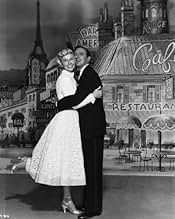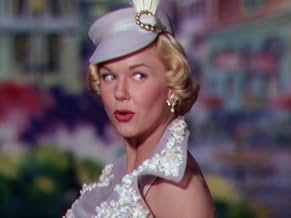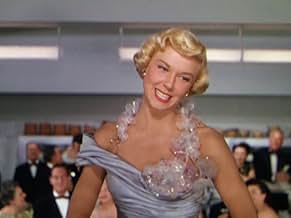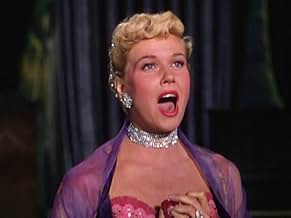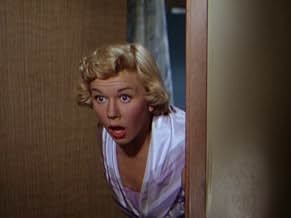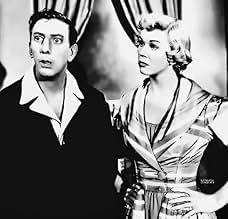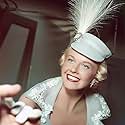IMDb RATING
5.9/10
1.6K
YOUR RATING
A series of misunderstandings leads to a chorus girl traveling to Paris to represent the American theater, where she falls in love with a befuddled bureaucrat.A series of misunderstandings leads to a chorus girl traveling to Paris to represent the American theater, where she falls in love with a befuddled bureaucrat.A series of misunderstandings leads to a chorus girl traveling to Paris to represent the American theater, where she falls in love with a befuddled bureaucrat.
Leon Alton
- Stagehand
- (uncredited)
Betty Arlen
- Young Woman
- (uncredited)
Frank Baker
- Delegate
- (uncredited)
Doris Barton
- Chorus Girl
- (uncredited)
Mary Bayless
- Ship Passenger
- (uncredited)
Mary Benoit
- Secretary
- (uncredited)
Featured reviews
First off, I am a huge Doris fan and I thought this movie was not one of her best (her own autobiography said she wanted someone different for the choreography...but I thought that was the best part). Doris is always good but the movie might have looked better if we saw some of the real Paris and why not show off some of the fashions sung about and actually see real settings.
Ray Bolger was NOT Fred Astaire but he sure is energetic. There was no real spark between Ray and Doris (who is excellent in the "Rock the Boat" number in the Cruiseliner's kitchen).
I bought this inexpensively from Ken Cranes on Laserdisc and Doris looks terrific as always. From what I've read Ray had some trouble with the director who accused him of trying to upstage Doris on camera - as if that were ever possible.
My advice...rent TEA FOR TWO instead.
Ray Bolger was NOT Fred Astaire but he sure is energetic. There was no real spark between Ray and Doris (who is excellent in the "Rock the Boat" number in the Cruiseliner's kitchen).
I bought this inexpensively from Ken Cranes on Laserdisc and Doris looks terrific as always. From what I've read Ray had some trouble with the director who accused him of trying to upstage Doris on camera - as if that were ever possible.
My advice...rent TEA FOR TWO instead.
A late-night viewing of this period piece shows it to be a charming and amusing glimpse into an earlier time. Doris Day holds up well, brightly singing, dancing, and portraying the all-American girl with gumption. Bolger's dancing is phenomenal, but the chemistry between them is not really there; it's hard to believe they really like each other very much. The costumes are outrageous in a campy way - almost Busby Berkley level synchronized dance scenes. A fashion-show scene shows overdone eccentric outfits in various colors, with French poodles dyed to match. In the last musical scene, Doris starts out with a floor-length gold cape with mini-pleats radiating from her shoulders; and then takes it off to show a bare midriff any current teenager would be proud of. The movie opens with some vintage scenes (current to the time of the film) of Washington DC, complete with streetcars. But the most anachronistic element is the main theme of the plot, which revolves around Bolger and Day coming close to sleeping together, thinking they are legally married, when in fact (horrors!!) they're not. In summary, it's a great combination of lightweight plot, eye candy, good music and a few laugh-out-loud lines, wrapped in the relative innocence of the fifties.
Of all the major Hollywood studios, Warner Brothers were always the most cheese-paring. All of their musicals -- except the wonderful 'Yankee Doodle Dandy' and some later adaptations of Broadway musicals -- are marred by extremely low budgets and obvious economy measures. 'April in Paris' is one of several Warners musicals featuring an established popular ditty (with a stiff price-tag for performance rights) as the movie's title song, buttressed by some very forgettable songs by resident Warners tunesmiths. Except for one high-spirited and high-kicking number called 'Ring the Bell Tonight', only the E.Y. Harburg/Vernon Duke title song is memorable here.
Doris Day amazes me, not only for her unearthly beauty and her quiet sex appeal, and for her underrated acting ability, but also for her musical talents. I've read that Day originally trained as a dancer, but switched to a career as a vocalist after she was injured in a car accident. Her singing voice is so clear and beautiful, I've difficulty believing that singing was her second choice of career. And, as she proves here, she has no physical handicap as a dancer ... unless you count the dull choreography of LeRoy Prinz.
Ray Bolger is an interesting choice of romantic leads for Day, but the two of them don't really team very well. Here, he plays a character very similar to the one played by Donald O'Connor in 'Are You with It?': a repressed wonk who turns out to be a superb dancer. Bolger (an underrated actor) is quite good in his straight scenes here as a harried bureaucrat, a less nelly version of Edward Everett Horton ... but that character just doesn't match up with Bolger's dazzling dance numbers. Bolger's Massachusetts accent is much more obvious here than in any of his other films. Bolger was sometimes required to play epicene men, as in the Broadway musical 'By Jupiter'. Here, he's impressively virile, as he strips off his dinner jacket and lights into some rapid-fire nerve taps far more proficient than Ann Miller's.
I always enjoy watching Bolger dance. Here, regrettably -- blame it on LeRoy Prinz -- Bolger doesn't do anything he hasn't done better in several better musicals, except for a brief trick shot in which he dances between two full-length portraits of Washington and Lincoln (also played by Bolger) who dance along with him. I was impressed with a brief pas de deux between Bolger and Day, in which she dances conventionally but manages to keep up with Bolger while he does his usual "Where's Charley?" moves.
The contrived plot line requires Bolger and Day to mistakenly believe they're married to each other. Two Frenchmen perform the wedding service without actually being qualified for that job. This being a Hollywood film of the 1950s, it's imperative that the fake marriage remain unconsummated, so the two Frenchmen then have conscience pangs and sabotage the marital bed so that no sex can take place ... instead of simply admitting their deception. Speaking of 1950s morals: this movie's dialogue features several occurrences of the word 'gay' in its innocent sense.
Two of my least favourite movie clichés are: every building in Washington DC is directly across the street from the Capitol, and every location in Paris has a clear view of the Eiffel Tower. We get both of those clichés in this movie. On the positive side, we get a brief appearance by character actor Shepard Menken as a Parisian waiter. Actress Eve Miller does her best in an unplayable role as Day's rival. Eve Miller's acting career never quite caught on; she suicided shortly after her fiftieth birthday.
The movie's weird plot gives us Claude Dauphin as an omniscient Frenchman. A gag sequence requires that Ray Bolger's hat be several sizes too large ... but later the same chapeau fits him perfectly, and later still it's too large again when the scriptwriter recycles the gag. This movie is more than competently directed by the underrated David Butler, but matters are not helped by a script which requires Day's and Bolger's characters to be unable to make up their minds about deeply important issues such as love and career. Still, as enjoyable froth, I'll rate 'April in Paris' 7 out of 10.
Doris Day amazes me, not only for her unearthly beauty and her quiet sex appeal, and for her underrated acting ability, but also for her musical talents. I've read that Day originally trained as a dancer, but switched to a career as a vocalist after she was injured in a car accident. Her singing voice is so clear and beautiful, I've difficulty believing that singing was her second choice of career. And, as she proves here, she has no physical handicap as a dancer ... unless you count the dull choreography of LeRoy Prinz.
Ray Bolger is an interesting choice of romantic leads for Day, but the two of them don't really team very well. Here, he plays a character very similar to the one played by Donald O'Connor in 'Are You with It?': a repressed wonk who turns out to be a superb dancer. Bolger (an underrated actor) is quite good in his straight scenes here as a harried bureaucrat, a less nelly version of Edward Everett Horton ... but that character just doesn't match up with Bolger's dazzling dance numbers. Bolger's Massachusetts accent is much more obvious here than in any of his other films. Bolger was sometimes required to play epicene men, as in the Broadway musical 'By Jupiter'. Here, he's impressively virile, as he strips off his dinner jacket and lights into some rapid-fire nerve taps far more proficient than Ann Miller's.
I always enjoy watching Bolger dance. Here, regrettably -- blame it on LeRoy Prinz -- Bolger doesn't do anything he hasn't done better in several better musicals, except for a brief trick shot in which he dances between two full-length portraits of Washington and Lincoln (also played by Bolger) who dance along with him. I was impressed with a brief pas de deux between Bolger and Day, in which she dances conventionally but manages to keep up with Bolger while he does his usual "Where's Charley?" moves.
The contrived plot line requires Bolger and Day to mistakenly believe they're married to each other. Two Frenchmen perform the wedding service without actually being qualified for that job. This being a Hollywood film of the 1950s, it's imperative that the fake marriage remain unconsummated, so the two Frenchmen then have conscience pangs and sabotage the marital bed so that no sex can take place ... instead of simply admitting their deception. Speaking of 1950s morals: this movie's dialogue features several occurrences of the word 'gay' in its innocent sense.
Two of my least favourite movie clichés are: every building in Washington DC is directly across the street from the Capitol, and every location in Paris has a clear view of the Eiffel Tower. We get both of those clichés in this movie. On the positive side, we get a brief appearance by character actor Shepard Menken as a Parisian waiter. Actress Eve Miller does her best in an unplayable role as Day's rival. Eve Miller's acting career never quite caught on; she suicided shortly after her fiftieth birthday.
The movie's weird plot gives us Claude Dauphin as an omniscient Frenchman. A gag sequence requires that Ray Bolger's hat be several sizes too large ... but later the same chapeau fits him perfectly, and later still it's too large again when the scriptwriter recycles the gag. This movie is more than competently directed by the underrated David Butler, but matters are not helped by a script which requires Day's and Bolger's characters to be unable to make up their minds about deeply important issues such as love and career. Still, as enjoyable froth, I'll rate 'April in Paris' 7 out of 10.
Doris Day is fun in this movie. Her smile lights up the screen, her rendition of the title song is not corny- it is terrific. Her dancing is vivacious and guaranteed to brighten up your day.
Bolger's dancing is a bit vaudevillian but has a happy uniqueness that is very watchable. Many of his moves are like a series of "controlled falls" that require tremendous balance- this is harder than it looks. On the other hand some of his dance is very above-average tap or two-step. Overall he seems to combine a lot into his different routines. As a bonus, his acting is not bad and better than you might expect.
This film suffers from cheapness and a nothing plot, but is overcome by exceptional talent and charm by all the cast. Who cares if it is cheap and set-bound? The results are entertaining and that's the true bottom line.
Bolger's dancing is a bit vaudevillian but has a happy uniqueness that is very watchable. Many of his moves are like a series of "controlled falls" that require tremendous balance- this is harder than it looks. On the other hand some of his dance is very above-average tap or two-step. Overall he seems to combine a lot into his different routines. As a bonus, his acting is not bad and better than you might expect.
This film suffers from cheapness and a nothing plot, but is overcome by exceptional talent and charm by all the cast. Who cares if it is cheap and set-bound? The results are entertaining and that's the true bottom line.
True, even for the breezy 1950s, the plot for this musical is as light as a feather--but if you are a DORIS DAY fan, as I certainly was during these early Day films at Warner Bros., you'll be enchanted by her way with a song--particularly "I'm Gonna Ring the Bell Tonight", "April in Paris" and "That's What Makes Paris Par-ee". And on top of that, she excels in all of her dance routines, even those in which RAY BOLGER clearly has the spotlight to himself.
It's one of those mistaken identity plots that Warners used extensively throughout the '40s and '50s, something about a showgirl being mistaken for a diplomat and mistakenly invited to represent the U.S. at a French festival. Naturally, all is straightened out in time for a happy ending although I can't say I detected any real chemistry between Bolger and Day--even in a musical where logic doesn't really matter.
The dances staged by LeRoy Prinz are not the best, but there are some cheerful, well staged moments when Bolger gets to do his tap routines and limber legged dancing. All in all, it passes the time pleasantly if you have a weakness for musicals the way they were in the '50s. And Doris proves that singing wasn't her only asset. Her dancing is also very professional (and not surprisingly, she intended to become a dancer before an accident ruined her plans and she switched to singing).
It's one of those mistaken identity plots that Warners used extensively throughout the '40s and '50s, something about a showgirl being mistaken for a diplomat and mistakenly invited to represent the U.S. at a French festival. Naturally, all is straightened out in time for a happy ending although I can't say I detected any real chemistry between Bolger and Day--even in a musical where logic doesn't really matter.
The dances staged by LeRoy Prinz are not the best, but there are some cheerful, well staged moments when Bolger gets to do his tap routines and limber legged dancing. All in all, it passes the time pleasantly if you have a weakness for musicals the way they were in the '50s. And Doris proves that singing wasn't her only asset. Her dancing is also very professional (and not surprisingly, she intended to become a dancer before an accident ruined her plans and she switched to singing).
Did you know
- TriviaDoris Day wrote in her autobiography that she only encountered trouble or tension on two of her Warner Bros. movies: 'April in Paris' and Un amour pas comme les autres (1954). Regarding this film, she claimed that leading man Ray Bolger and director David Butler clashed early on, with Butler accusing Bolger of trying to steal scenes away from Day. She also mentioned that being a relative newcomer to movies, she was unaware of Bolger's tricks and managed to stay out of the line of fire.
- GoofsRay Bolger supposedly flies to New York when he realizes the invitation mixup, but the plane is shown flying over the Wrigley Building in Chicago.
- Quotes
Ethel S. 'Dynamite' Jackson: It's no use, Philippe. I'm in love with the man I married. And he's not even my husband!
Philippe Fouquet: Even in Paris, that's an unusual situation.
- ConnectionsFeatured in IMDb Originals: Doris Day: In Memoriam (2019)
- How long is April in Paris?Powered by Alexa
Details
- Runtime
- 1h 40m(100 min)
- Aspect ratio
- 1.37 : 1
Contribute to this page
Suggest an edit or add missing content


